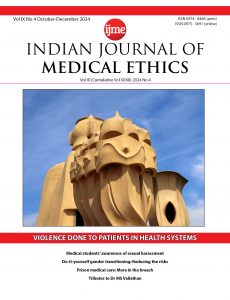
The job of ethicists is to probe the smooth surface of appearances and expose the reality. An editorial in this issue focuses on the gross and subtle violence against underprivileged and other patients in our health system and demands action to prevent it. Another editorial deals with hazardous self-medication by transpeople who cannot afford the expensive hormone treatments available, and possible solutions.
Considering the rampant sexual abuse in our society, a study examines medical students’ awareness of sexual misconduct and discrimination at their workplace. One author reflects on the best aspect of the doctor-patient relationship as a powerful pathway to healing, and another exposes one of its worst aspects, the gaming of health insurance schemes.
Two articles reflect on neglect and abuse in Indian prisons — one on what passes for medical care in prison, the other on human rights abuses of prisoners with disability.
How effective is ethics education in India? A group of researchers describes its participative approach in involving community health workers in creating their own ethics curriculum, another analyses the use of trigger films for ethics awareness, and a letter looks at making clinicians aware of pharma promotions’ impact on their prescribing practices.
Important questions are also raised on the right to advance planning for fatal illness, the recent limiting of medical seats in “advanced states”; and on extracting care from poorly paid community health workers. We mourn the loss of Dr MS Valiathan, a rare colossus committed to innovative cardiac surgery, medical education, manufacture of life saving components, and Ayurveda scholarship.
__________________________________________________________________________________________________________Cover credit: Gaudi’s Casa Milà chimneys in Barcelona — inspiration for Star Wars stormtroopers, courtesy Sundeep Kumar.
